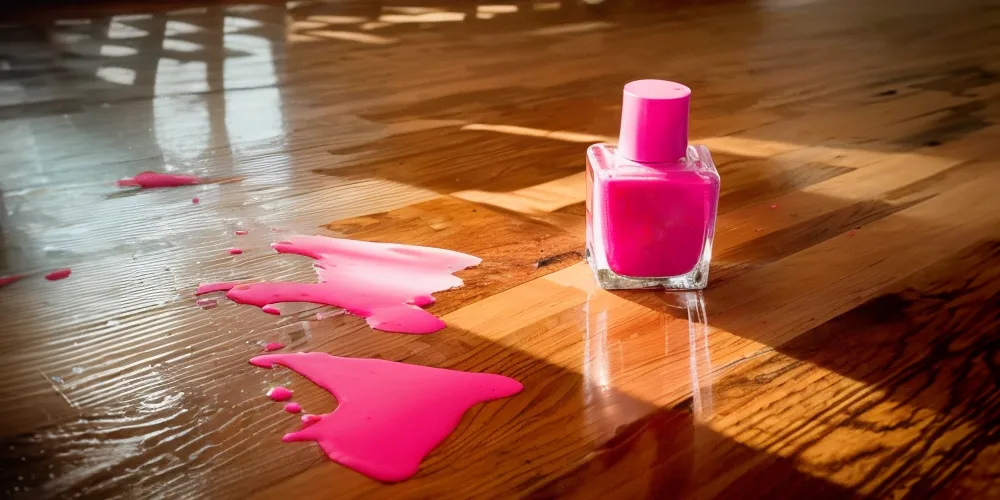The convenience of nail polish remover can feel like a magician’s tool – a quick swipe and unwanted color vanishes from your fingertips. But this magic trick can have unintended consequences. The very properties that make nail polish remover so effective raise concerns about its potential to inflict damage on delicate surfaces like hardwood floors. Does this potent concoction truly pose a threat to the luster and longevity of your prized wooden flooring?
This comprehensive exploration delves into the chemical composition of nail polish remover and its interaction with various hardwood finishes. By unveiling the science behind the interaction, we empower you to make informed decisions regarding the safe and effective use of nail polish remover around your home.
Unveiling the Formula: Demystifying Nail Polish Remover
Nail polish remover isn’t a homogenous entity. It’s a carefully formulated blend designed to dissolve polish quickly and efficiently. However, the key player in this formulation often takes center stage – acetone.
-
The Powerhouse Solvent: Acetone’s Role in Polish Removal: Acetone, a colorless, volatile liquid with a pungent odor, is the primary solvent responsible for dissolving nail polish. It works by disrupting the intermolecular forces holding the polish together, causing it to break down and become easily removed. This efficiency is what makes acetone such a popular choice in nail polish removers.
-
Beyond Acetone: Exploring Additional Ingredients: While acetone is the muscle behind nail polish removal, it’s not always the only ingredient. Some removers incorporate additional components to enhance their properties or address potential drawbacks of pure acetone. For instance, some removers contain emollients, which are moisturizing agents that help prevent your skin from drying out during use. Other removers might include fragrances to mask the strong odor of acetone. It’s important to note that the presence of these additional ingredients doesn’t necessarily negate the potential risks associated with acetone when it comes to hardwood floors.
The Floor Fights Back: How Nail Polish Remover Affects Hardwood Finishes
The impact of nail polish remover on hardwood floors hinges on the type of finish applied to the wood. Understanding the finish allows us to predict how it might react to the chemical assault of acetone.
-
The Dissolution Dilemma: Acetone’s Impact on Varnishes and Polyurethanes: The most common finishes for hardwood floors are varnishes and polyurethanes. These finishes create a protective layer on the wood, enhancing its durability and shine. Unfortunately, acetone is a powerful solvent, and its dissolving prowess extends beyond nail polish. When acetone comes into contact with a varnish or polyurethane finish, it can start to break down the protective layer, causing the finish to become dull, cloudy, or even develop white streaks. In severe cases, prolonged exposure to acetone can even lead to the complete removal of the finish, leaving the bare wood vulnerable to moisture and scratches.
-
Beyond the Surface: Potential Damage to Oiled Finishes: While varnishes and polyurethanes create a barrier on the wood’s surface, oiled finishes penetrate deeper into the wood grain. This difference in how the finish interacts with the wood also influences how it reacts to nail polish remover. Acetone can still pose a threat to oiled finishes, although the damage might manifest differently. While it might not completely dissolve the finish like with varnishes, acetone can leach out the oils, leaving the wood dry and looking lackluster. Furthermore, the removal of oils can compromise the water-repellent properties of the finish, making the wood more susceptible to water damage.
Navigating the Nail Polish Nightmare: Safeguarding Your Hardwood Floors
Knowing the potential risks associated with nail polish remover on hardwood floors empowers you to take preventative measures and address spills promptly.
-
When Acetone is Acceptable: Assessing Floor Finish Compatibility: The good news is that not all nail polish removers are created equal. Many removers on the market are acetone-free, formulated with gentler solvents that are less likely to damage hardwood finishes. If you have hardwood floors and use nail polish remover frequently, consider switching to an acetone-free variety. Always check the manufacturer’s recommendations for your specific floor finish to determine if a particular nail polish remover is safe to use.
-
Alternative Approaches: Eco-Friendly Solutions for Light Stains: For minor nail polish spills on your hardwood floor, you might be able to avoid harsh chemicals altogether. White vinegar, a readily available and eco-friendly hero, can tackle light nail polish stains. The mild acidity of vinegar helps break down the polish without harming the finish. Apply white vinegar to a clean cloth and gently blot the stain. Repeat this process until the stain is gone.


